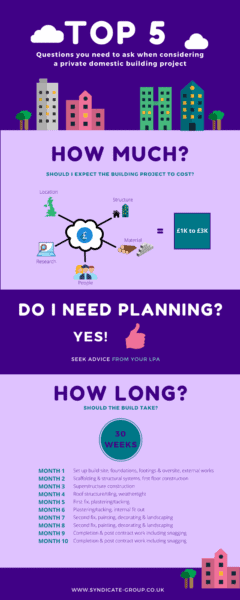In our many years working in the industry we have had multiple questions asked us when guiding people on their private domestic build projects. We have whittled it down to five to help you get started on your new venture.
1. How much should I expect a private domestic build to cost?
How long is a piece of string? Every build is different so total costs can vary dramatically. The size of the build, the location, the structure of your build, number of storeys, the spec of material, the people you employ, whether you self-manage or employ a project manager. These are just a few factors to take on board when deciding to embark on your private domestic build project.
However; as a rule of thumb, on average it will cost between £2,000 and £3,000 per m2 so as a guideline prepare to budget for the mid-way amount and that way, you cover your costs.
It is wise to do as much research and cost planning upfront to avoid any financial dilemmas that could occur if you chose not to do your homework.
2. Do I need planning permission?
In short YES. Unless the plot has planning already associated with it. It is advised to seek advice from your local planning authority (LPA) to check to see if there are any constraints on the land.
3. How long should it take?
Depending on the type of build and how many storeys you plan, typically on average a three-bedroom house would take around 30 weeks. However, depending on the type of build method you use, this could be shorter with a 30% faster build time using prefabricated timber frame than traditional block build method.
There is also the good old British weather to contend with. Do not be surprised that everything comes to a halt when the rain clouds come out. Water and building sites do not work well together, so bare that in mind when planning your build, especially in the Winter months.
Supply and demand have also an influence on build projects. With the current climate as it is there is short supply in building materials so lead times are a lot longer**. Under normal circumstances a self- build project would on average take around 30 weeks or 10 months.
Below is a sample project plan of timings:
Month One – Set up build site, foundations footings & oversite, external works
Month Two – Scaffolding & structural systems, first floor construction
Month Three – Superstructure construction
Month Four – Roof structure/tiling, works to weathertight
Month Five – First fix, plastering/ tacking,
Month Six – Plastering/ tacking, Internal fit out
Month Seven – Second fix, painting, decorating & landscaping
Month Eight – Second fix, painting, decorating & landscaping
Month Nine – Completion & post contract work including snagging
Month Ten – Completion & post contract work including snagging
It is imperative that before any work starts on site that all the preparation work has been executed. This includes; (and not exclusive to)


- Land acquired
- Designs drawn up
- Planning permission granted (see below)
- Building Regulations plans and SAP assessment approved
- Go to tender and contractor selected
- Services arranged via suppliers
- Insurances and warranties bought
- Planned lead times for materials
4. (Topical) What effects is Covid having on materials and labour prices?
In the current climate with Covid-19 still being a big part of our lives we have observed a chain reaction in the supply of materials within the industry.
Supplies from factories have reduced; supply chain bottlenecks have occurred due to shortages worldwide, container shortages and port delays, and an increase in construction demands have all had an impact leading to increased prices. For example, the price of imported timber rose by 64% from July 2020 to 2021.*
With regards to private domestic build projects, understanding that traditional time frames have extended, and supply of materials are not so free to come by, that more planning is needed, can set expectations from the get-go of the project. By using alternative materials, sourcing locally as opposed to imported goods, can keep costs down and reduce lengthy delays.
With regards to labour costs, throughout the pandemic there has been a decrease in labour availability with companies having to make up for the shortage. So not only were materials in short supply but so was staff. This has had a knock-on effect seeing labour costs increase along with materials.
5. How do I check if my preferred builder is reputable, reliable and financially sound.
First place would be to get recommendations from friends or family. This is the ultimate endorsement. Knowing someone who has received satisfactory work gives you the confidence in progressing the project with them.
Secondly using an authoritative body to qualify them. Whether they are TrustMark registered or registered with the General Builder Trade Association for example. But do check they are legitimately part of the association.
Check the builders ‘Codes of Practice’ to see what protection they offer you. Any guarantees they offer during the build and on final completion.
Search online websites who run background checks and encourage customer reviews. Check references on past jobs for feedback.
And always get at least three quotes from different companies to get an idea on current competitive rates. Ask for a detailed plan in writing of the works covered in the quote so all parties are clear.
Look the company up on Companies House and access their accounts and data.
Once you are happy with your chosen builder set a start date to begin your building project.
If you are starting your private domestic build project and would like further advice please get in touch and we’ll be happy to discuss your options.
*Source: Department for Business, Energy & Industrial Strategy
**As at time of writing 2023